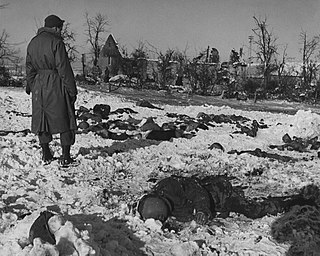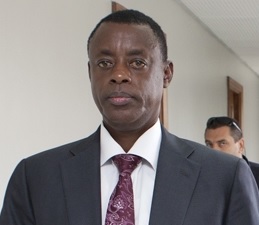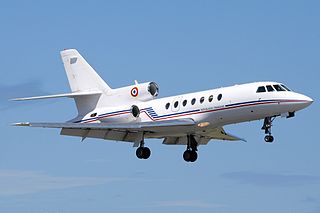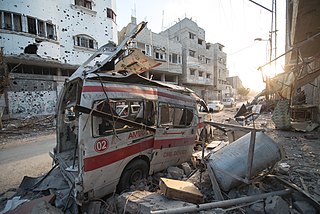
A war crime is a violation of the laws of war that gives rise to individual criminal responsibility for actions by combatants in action, such as intentionally killing civilians or intentionally killing prisoners of war, torture, taking hostages, unnecessarily destroying civilian property, deception by perfidy, wartime sexual violence, pillaging, and for any individual that is part of the command structure who orders any attempt to committing mass killings including genocide or ethnic cleansing, the granting of no quarter despite surrender, the conscription of children in the military and flouting the legal distinctions of proportionality and military necessity.
Universal jurisdiction is a legal principle that allows states or international organizations to claim criminal jurisdiction over an accused person, regardless of where the alleged crime was committed and irrespective of the accused's nationality, country of residence, or any other connection to the prosecuting entity. Crimes prosecuted under universal jurisdiction are considered crimes against all, too serious to tolerate jurisdictional arbitrage. The concept of universal jurisdiction is therefore closely linked to the idea that some international norms are erga omnes, or owed to the entire world community, as well as to the concept of jus cogens—that certain international law obligations are binding on all states.

Crimes against humanity are certain serious crimes committed as part of a large-scale attack against civilians. Unlike war crimes, crimes against humanity can be committed during both peace and war and against a state's own nationals as well as foreign nationals. Together with war crimes, genocide, and the crime of aggression, crimes against humanity are one of the core crimes of international criminal law and, like other crimes against international law, have no temporal or jurisdictional limitations on prosecution.

Salah Mustafa Muhammad Shehade was a member of the Palestinian Islamist movement Hamas. He led the Izz ad-Din al-Qassam Brigades military wing of Hamas, until his assassination by Israel.

James Kabarebe is a Rwandan retired military officer who has served as a Senior Presidential Adviser on security matters in the government of Rwanda, since 19 October 2018.

On the evening of 6 April 1994, the aircraft carrying Rwandan president Juvénal Habyarimana and Burundian president Cyprien Ntaryamira, both Hutu, was shot down with surface-to-air missiles as their jet prepared to land in Kigali, Rwanda; both were killed. The assassination set in motion the Rwandan genocide, one of the bloodiest events of the late 20th century.

Stephen J. Rapp is an American lawyer and the former United States ambassador-at-large for war crimes issues in the Office of Global Criminal Justice.
The International Criminal Court's founding treaty, the Rome Statute, provides that individuals or organizations may submit information on crimes within the jurisdiction of the Court. These submissions are referred to as "communications to the International Criminal Court".

William Anthony Schabas, OC is a Canadian academic specialising in international criminal and human rights law. He is professor of international law at Middlesex University in the United Kingdom, professor of international human law and human rights at Leiden University in the Netherlands, and an internationally respected expert on human rights law, genocide and the death penalty.
Accusations of violations regarding international humanitarian law, which governs the actions by belligerents during an armed conflict, have been directed at both Israel and Hamas for their actions during the 2008–2009 Gaza War. The accusations covered violating laws governing distinction and proportionality by Israel, the indiscriminate firing of rockets at civilian locations and extrajudicial violence within the Gaza Strip by Hamas. As of September 2009, some 360 complaints had been filed by individuals and NGOs at the prosecutor's office in the Hague calling for investigations into alleged crimes committed by Israel during the Gaza War.

The United Nations Fact Finding Mission on the Gaza Conflict, also known as the Goldstone Report, was a United Nations fact-finding mission established in April 2009 pursuant to Resolution A/HRC/RES/S-9/1 of the United Nations Human Rights Council (UNHRC) of 12 January 2009, following the Gaza War as an independent international fact-finding mission "to investigate all violations of international human rights law and international humanitarian law by the occupying Power, Israel, against the Palestinian people throughout the Occupied Palestinian Territory, particularly in the occupied Gaza Strip, due to the current aggression". South African jurist Richard Goldstone was appointed to head the mission. The other co-authors of the Report were Hina Jilani, Christine Chinkin and Desmond Travers.
Emmanuel Karenzi Karake is a Rwandan Lieutenant-General who is the former Secretary General of the National Intelligence and Security Services (NISS).

Reactions to the 2014 Gaza War came from around the world.
The year 2023 in Israel was defined first by wide-scale protests against a proposed judicial reform, and then by the Hamas-led attack on Israel on October 7, which led to a war and to Israel invading the Gaza Strip.

Israeli war crimes are the violations of international criminal law, including war crimes, crimes against humanity and the crime of genocide, which the Israel Defense Forces, the military branch of the state of Israel, has been accused of committing since the founding of Israel in 1948. These have included murder, intentional targeting of civilians, killing prisoners of war and surrendered combatants, indiscriminate attacks, collective punishment, starvation, the use of human shields, sexual violence and rape, torture, pillage, forced transfer, breach of medical neutrality, targeting journalists, attacking civilian and protected objects, wanton destruction, incitement to genocide, and genocide.

Since the start of the Israel–Hamas war on 7 October 2023, the UN Human Rights Council has identified "clear evidence" of war crimes by both Hamas and the Israel Defense Forces. A UN Commission to the Israel–Palestine conflict stated that there is "clear evidence that war crimes may have been committed in the latest explosion of violence in Israel and Gaza, and all those who have violated international law and targeted civilians must be held accountable." On 27 October, a spokesperson for the OHCHR called for an independent court to review potential war crimes committed by both sides.

Israel has been accused of committing genocide in the Israel–Hamas war, and the United States has been accused of complicity in the genocide. The complicity accusation has been made in court, by federal staffers, human rights organizations and academic figures around the world. The US has also been accused of enabling the Gaza Strip famine.

Since the beginning of the Israel–Hamas war in 2023, the Israeli military and authorities have been charged with committing war crimes, such as indiscriminate attacks on civilians in densely populated areas ; genocide; forced evacuations; the torture and executions of civilians; sexual violence; destruction of cultural heritage; collective punishment; and the mistreatment and torture of Palestinian prisoners. Humanitarian organizations such as Human Rights Watch, Amnesty International, B'tselem, the UN Independent International Commission of Inquiry, the UN Human Rights Council, and human rights groups and experts, including United Nations special rapporteurs, have documented these actions.
On 13 July 2024, Israeli airstrikes hit the Al-Mawasi area near Khan Yunis in the Gaza Strip during the Israel–Hamas war. The attack killed at least 90 Palestinians, among them women and children, and injured over 300. Israel said that the strike targeted Hamas top leaders. Survivors reported that they were targeted without warning in an area they were told was safe.
On 10 August 2024, Israel struck the Al-Tabaeen school located in eastern Gaza City, which was hosting displaced Palestinians seeking shelter there during the Israel–Hamas war. At least 80 Palestinians were killed and 47 others were injured, with several victims being trapped in the school as the fire spread, according to Palestinian health authorities.













